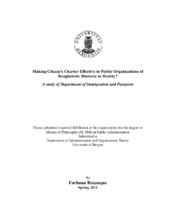| dc.description.abstract | Citizen's Charter (CC), as a means of improving public service delivery has become popular around the world since the 1990s. In order to change administrative rigidity and enhance responsiveness of public organizations to society, the Government of Bangladesh (GOB) introduced CC in 2007. The principal objective of this study is to assess the effectiveness of this CC program. It also attempts to explore and analyze the factors and actors that may have bearing on the effectiveness of CC program in public organizations. The focus of this study is the Department of Immigration and Passports (DIP) of GOB. Pertinent literature review revealed that public service delivery qualities are improved through tools like CC and are usually measured looking at some indicators. In this study the effectiveness of CC is measured by five service quality dimensions. These are timeliness, accessibility, responsiveness, cost effectiveness, and grievance redress mechanism. Two independent variables i.e., organizational culture and human resource have also been identified and discussed that may influence the extent of effectiveness of CC initiative. Combinations of quantitative and qualitative methods have been used in this study. As for data collection tools, semi structured interviews with both open and close ended questions, observation, and documentary analysis were used. Two different sets of questionnaires were used to obtain primary data from both service providers and service seekers of DIP. The findings of this study revealed that citizen's charter at DIP largely successful in providing required information to the service seekers and successful to some extent in ensuring accessibility to concerned officials. However, it was also disclosed that service seekers sometimes find the officials unfriendly and unresponsive. Moreover, it was found that service provision is costly and complaint system is fully non-functional. All these indicate that the quality of service provision at DIP is yet to be satisfactory leading to conclusion that the goals of CC are not fully realized so far. This is because of the organizational culture of DIP which is still traditional. In fact, two indicators of rigid traditional organizational culture i.e., high power distance and strong uncertainty avoidance tendency are existent and affecting the outcome of CC implementation at DIP. Furthermore, the findings also revealed that human resources at DIP is inadequate in number and even the available personnel are lack of socialization with the ethos and principles of CC. As a result DIP personnel are less committed to CC goals subsequently negatively contributing to achievement of CC goals. | en_US |
